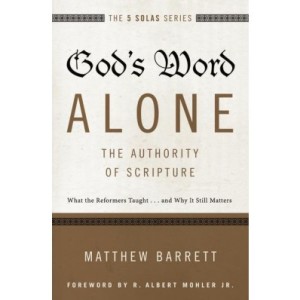It was Martin Luther who said, “Let the man who wishes to hear God speak read Holy Scriptures.” Such reading, unfortunately, has not come easily. From the beginning, the enemy has sought to undermine God’s word: “Did God really say,” hissed the serpent of old.
Given this hostility to God’s authority, humanity through the ages has followed the serpent by casting aspersions upon sacred Scripture. Instead of receiving the light of revelation, the darkness instinctively recoils from it. In this human response, Luther highlights an inextricable link between Christ the living word and Christ the written word:
The Holy Scripture is God’s Word, written and, so to speak, lettered and put into the form of letters (gebuchstabet und in Buchstaben gebildet), just as Christ, the eternal Word of God, is clothed in humanity. And men regard and treat the written Word of God in this world just as they do Christ….
Faced with this perpetual challenge—the recoiling of humanity from the authoritative voice of God—how shall God’s people uphold the centrality of Scripture? Enter the new book by Dr. Matthew Barrett, God’s Word Alone: The Authority of Scripture. Having examined the central role of Scripture for Christian faith Sunday’s Reformation Day sermon, I wish to commend Barrett’s book as a volume that deserves a place on the bookshelf of every thoughtful Christian.

Let me first go on record as saying this is the finest contemporary treatment of the subject of Scripture that is currently in print. Matthew Barrett, Tutor of Systematic Theology and Church History at Oak Hill Theological College, London, is recognized as a pastor-theologian par excellence. This book is part of the five-volume series, which he is editing called The 5 Solas, released in time for the 500th anniversary of the Reformation next year.
Known for his academic gründlichkeit (thoroughness), Barrett provides a view of the forest and also the trees. This is illustrated by the beefy footnotes that appear on virtually every page, evidence that this project took him a full three years to complete. But he is also a pastor who writes in a refreshingly simple style. For example, here is how he begins his conclusion, “My mother gave me a Bible when I was a boy and told me to read it. So I did. And God saved me” (373). The prose is simple, but far from simplistic.
The book has four major sections. First, it travels backward in time to argue that a shift in authority has happened since the Reformation, a shift that has profound implications for the present. This first part starts with the conviction of the Magisterial Reformers, explaining the challenges and opportunities they faced in opposition to Rome. From there it goes to the crisis of authority that followed when reason eclipsed revelation in the so-called Enlightenment, the harbinger of theological Liberalism. Barrett presents this as an earth-quaking shift in biblical authority, which has reoriented our ecclesiastical landscape. What is the solution? Cling to Scripture as the sole inspired lamp for our feet and light on our path.
Of particular importance is the section titled “How Shall We Then Proceed?” at the conclusion of chapter three. There we find an explanation of how to approach Scripture in contrast to the various postmodern techniques of interpretation, which currently have cache. It starts by listening to what the Bible says about itself, the way it challenges our assumptions and pre-understandings, leading us to bow our beliefs to the message of the text. It is a faith seeking understanding, a motto the Reformers inherited from the church fathers.
Another distinctive trait of this volume, which constitutes part two, is the way Barrett explores insights from the field of biblical theology. He traces the redemptive-historical context—the warp and woof of God’s recorded saving acts in time and space—to show that the triune God has made himself known covenantally, a covenantal word that always proves true. There are two assumptions undergirding this section. First, Scripture proceeds from God himself and is therefore Trinitarian in nature—Father, Son, and Holy Spirit cooperating to express divine truth to humanity. He also assumes that this revelation is covenantal in the sense that it conveys redemptive promises to lost people, men and women whom God draws to himself through his Son, Jesus Christ.
Third, instead of limiting the scope of his analysis to the sufficiency of Scripture (as books on this subject often do), Barrett explores the many facets of biblical authority that have significance for the Christian life and for the apologetic challenge before the church. This leads to a treatment of the subject of Scripture’s inerrancy, the truthfulness and trustworthiness of the text, which enables us to confidently assert, “Thus says the Lord.” A focal point of this section is the person and ministry of our Lord Jesus Christ, who consistently related to Scripture in this manner.
Finally, Barrett turns his attention to the clarity and sufficiency of Scripture. He quotes Alan Bloom who said in his classic book The Closing of the American Mind, “There is one thing a professor can be absolutely certain of: almost every student entering the university believes, or says he believes, that truth is relative” (302). Over against this view, Barrett asserts that God is not silent (to quote Francis Schaeffer) but the silence is broken by the powerful and clear word that he speaks to his creation. The One who created language is capable of speaking in a way that he can be understood.
Barrett concludes with some thoughts on the sufficiency of Scripture. He highlights that few attributes of God’s Word quite like this one have such warm and practical implications for Christian life. From this treatment he considers contemporary challenges to the Bible’s sufficiency from the traditionalists (especially from Rome and her view of the canon), science and reason, and finally to personal experience and the forces of culture that impose themselves.
I conclude this brief review with Barrett’s concluding words:
“At its most basic level, this means the Word of God must take first place among the people of God. Sunday mornings are focused not around flashy guitar solos, funny anecdotes, or feel-good messages, but around the proclamation of the Word. Only then can we sincerely and genuinely repeat after the psalmist: ‘I will never forget your precepts, for by them you have preserved my life… Your word is a lamp for my feet, a light on my path’” (Ps. 199:93, 105).





